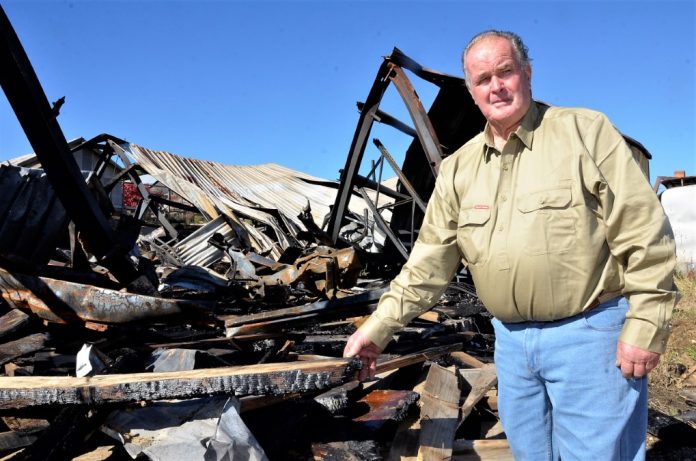A devastating shed fire at Yapeen in recent days spotlights a wider issue of dogs attacking livestock in the area.
Late afternoon, April 25 just gone, beekeeper and honey producer Noel Taylor was using gas to melt hive wax in his big honey production shed when his neighbour across the road phoned with the shocking news that two dogs were attacking his expensive dorper ewes and lambs.
Mr Taylor, 75, immediately jumped in his car and went to stop the dogs, managing to catch and secure them both.
Mr Taylor said he then delivered both dogs to their owner and it was while all this was happening that his large honey production shed containing valuable honey, tools and equipment – all together valued at about $100,000– went up in flames.
By the time fire crews arrived on site, the shed and contents were fully alight.
While firefighters fought to stop the blaze spreading to the Taylors’ nearby house, the shed was completely destroyed, and with it the uninsured contents including $18,000 worth of honey and machinery ranging from a forklift to extracting equipment worth many tens of thousands of dollars.
“When I took the dogs back to the owner, the owner asked which one was the killer and I said ‘they’ve both got blood on their mouths. They’re both killers’,” Mr Taylor said.
As a result of the attack, Mr Taylor lost two ewes valued at $400 each and three lambs, with another six sheep injured, some so badly they may not survive either.
He now fears the dogs may return to attack again at any time.
“The council officer told me that if any dogs come back on the property I have legal rights to shoot them. But you can’t be in the paddock all night,” he said.
Like several other livestock owners in the immediate area and beyond, Mr Taylor told the Express the problem of dogs attacking livestock was increasing as more lifestyle residences filled the landscape, bringing people who may not realise their family pet has another side.
“People think their dog doesn’t ever leave home and it wouldn’t ever do that sort of thing if it did. But we’ve had examples of it. It’s usually two dogs on the job and once they get the taste of blood there’s no stopping them after that,” Mr Taylor said.
Not far across the paddocks at Guildford, farmer Bob Forde said about two months ago a dog attack on his property left four sheep dead and another badly injured, with memories of another shocking dog attack not likely to fade any time soon.
“In 2015 we lost 40 sheep in two attacks but when it went to court the only one they’d convict for was the one that was captured getting mauled to death right in front of the CCTV up at the house,” Mr Forde said.
“Because of the CCTV you could see the dog killing this sheep – but all the others were considered circumstantial even though there was a trail of dead sheep for about a kilometre from the house to the boundary fence. The owner had let the dog roam.
“My brother-in-law nearby has also lost 69 sheep in three attacks.”
Now beekeeper Mr Taylor, who also sustained burns to his head as his shed burnt down, has been left to battle for any hope of an insurance pay-out on the decimated shed structure.
“They’ve told me it’s not insured because it’s a commercial shed – and the contents definitely aren’t insured,” he said.
His pleas for dog owners to keep their pets properly secured at all times comes as the magistrates court in Castlemaine two Fridays back convicted an Irishtown man over a dog attack in February that left 12 sheep dead and 17 others injured at the property of Glenluce farmer Lance McDonald.
The court directed the owner of the two dogs involved in that attack to pay $4000 in fines, $2540 in costs, and compensation of $7116 to Mr McDonald. Both dogs involved in that attack have been destroyed.
“If the dog is put down people say ‘oh poor dog’,” Guildford’s Mr Forde said.
“But nobody thinks about the terror and trauma of the sheep that are defenceless.”








